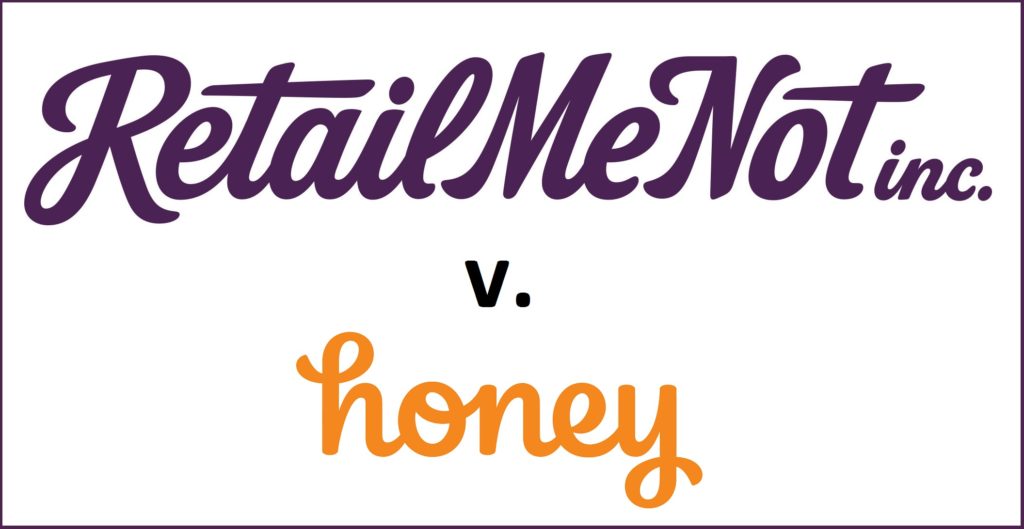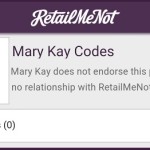
Couponers can sometimes be competitive in search of deals – but they have nothing on a couple of internet coupon providers, who are currently quarreling in public ahead of a battle in court.
RetailMeNot, the country’s largest online coupon code site, is suing competitor Honey Science Corp., accusing it of infringing four U.S. patents related to how coupon codes are applied on retailers’ websites.
Patent disputes can be dry affairs, often conducted out of the public eye. But RetailMeNot took the unusual step this week of announcing its lawsuit in a news release.
“These valuable patents protect RetailMeNot’s pioneering developments in computer-related technologies, and Honey’s unauthorized use of them enables key features of Honey’s website and browser extensions,” the company proclaimed. “RetailMeNot’s lawsuit therefore seeks both a permanent injunction and damages in an amount to be determined at trial.”
The patents deal with the under-the-hood workings of the competing coupon code sites. You probably never give it a second thought, but the process of clicking on a deal on RetailMeNot’s website, being redirected to a retailer’s website and having the associated coupon code automatically cut-and-pasted onto that third-party site, is actually a rather complicated process.
RetailMeNot’s lawsuit explains how it patented its methods of accomplishing just that – and how Honey is allegedly using those same methods in violation of RetailMeNot’s rights.
“Honey’s continued infringement after having knowledge of the Patents-in-Suit is willful and deliberate,” the lawsuit reads. “By earning commissions for each use of its website and browser extension, Honey is depriving RetailMeNot of commissions it would otherwise earn.”
Honey was founded in 2012, six years after RetailMeNot came onto the scene. While RetailMeNot is best known for its website, which features coupon codes for thousands of online stores, Honey’s main claim to fame is its browser extensions, which allow you to try out any available coupon codes as you’re shopping on retailer websites.
And this isn’t the first time Honey has rubbed a larger and more established competitor the wrong way. Back in 2014, Honey debuted a companion feature called Milk. Milk aimed to simplify and automate the process of clipping digital grocery coupons, the way Honey simplifies and automates the process of applying online coupon codes. All you had to do was download the Milk app, click a button, and every digital coupon available at your favorite grocery store would be saved to your account. No more searching through each individual offer and having to click on each one that you want.
And Coupons.com promptly sued, demanding that the app be discontinued. Milk violated Coupons.com’s terms of service, it argued, which “forbid consumers from using any automated process to activate coupons… without consciously selecting which coupon they wish to use.”
Honey CEO George Ruan grumbled to Coupons in the News at the time that “some players are more interested in defending their existing interests” than they were in allowing an innovator to create “a grocery coupon app for non-couponers”. Nonetheless, Honey quickly gave in and pulled the plug on Milk, after which Coupons.com dropped its lawsuit.
But this time, Honey sounds ready to fight back against RetailMeNot’s claims. And it doesn’t seem particularly impressed with RetailMeNot’s P.R. strategy of publicly announcing its legal challenge.
“We were disappointed to learn of this lawsuit from a press release and are in the process of reviewing the documents with our legal counsel,” Honey spokesperson Kelly Parisi told Coupons in the News in a statement. “The lawsuit is baseless and the claims are irrelevant to how consumers use and experience our services. It’s unfortunate that they’ve taken this tactic to try to thwart innovation that helps consumers save time and money when shopping online.”
A spokesperson for RetailMeNot declined to comment beyond what was in its news release.
So the next time you go hunting for a coupon code online, and a Google search turns up dozens or hundreds of websites offering to help you find one, now you have an idea of just how competitive the business of providing coupon codes really is. And now, this court case shows the lengths to which companies will go, to ensure they get the upper hand.














